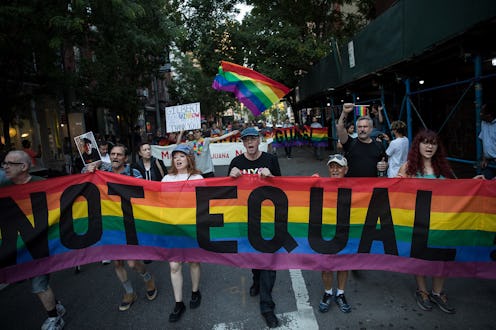News
Texas Court Refuses To Give Same-Sex Spouses Benefits

The Supreme Court of Texas has found that the the city of Houston is not required to provide same-sex spousal benefits for its public employees, highlighting some of the still-unresolved marriage equality legal battles that have been simmering since the U.S. Supreme Court's Obergefell v. Hodges ruling of 2015.
The state's nine justices were unanimous in the decision. In short, the ruling would mean that while Texans have the right to same-sex marriage under the U.S. Constitution, those married couples do not have the right to the same benefits that heterosexual ones receive ― like, for example, health insurance benefits earned by a spouse who works for the city of Houston.
As the Austin American-Statesman details, opponents of same-sex marriage have hailed the decision as a victory for taxpayers, while GLAAD president Sarah Kate Ellis responded to the decision with a strong condemnation, calling it evidence that anti-LGBTQ activists and advocates will stop at nothing to stymie fair and equal marriage rights. Said Ellis:
The Texas Supreme Court’s decision this morning is a warning shot to all LGBTQ Americans that the war on marriage equality is ever-evolving, and anti-LGBTQ activists will do anything possible to discriminate against our families.
According to the American-Statesman, Texas Attorney General Ken Paxton hailed the decision, calling it a recognition that "Texas law is still important when it comes to marriage”:
While the U.S. Supreme Court declared a right to same-sex marriage, that ruling did not resolve all legal issues related to marriage.
In the aftermath of the Obergefell v. Hodges ruling, some socially conservative states sought to blunt its impact, whether by flatly defying it like Kentucky county clerk Kim Davis, or as in this case, by narrowly defining it as legalizing same-sex marriage, but not mandating equal benefits or recognitions.
While the Texas Supreme Court's ruling has big implications for the LGBTQ residents of the state, and is undeniably a big setback for the advancement of same-sex marriage rights, this particular case is almost assuredly not over. It's widely anticipated that the decision will be appealed up to the federal court system, where it could ultimately fall to the U.S. Supreme Court to weigh in.
It's unclear what decision the high court would reach, however. While the partisan balance of the justices remains the same ― for now, at least ― trying to predict Supreme Court rulings months or years in advance is a deeply challenging and uncertain pastime. The only certainty, really, is that pro-LGBTQ marriage activists and advocates won't allow the Texas ruling to be the last word.